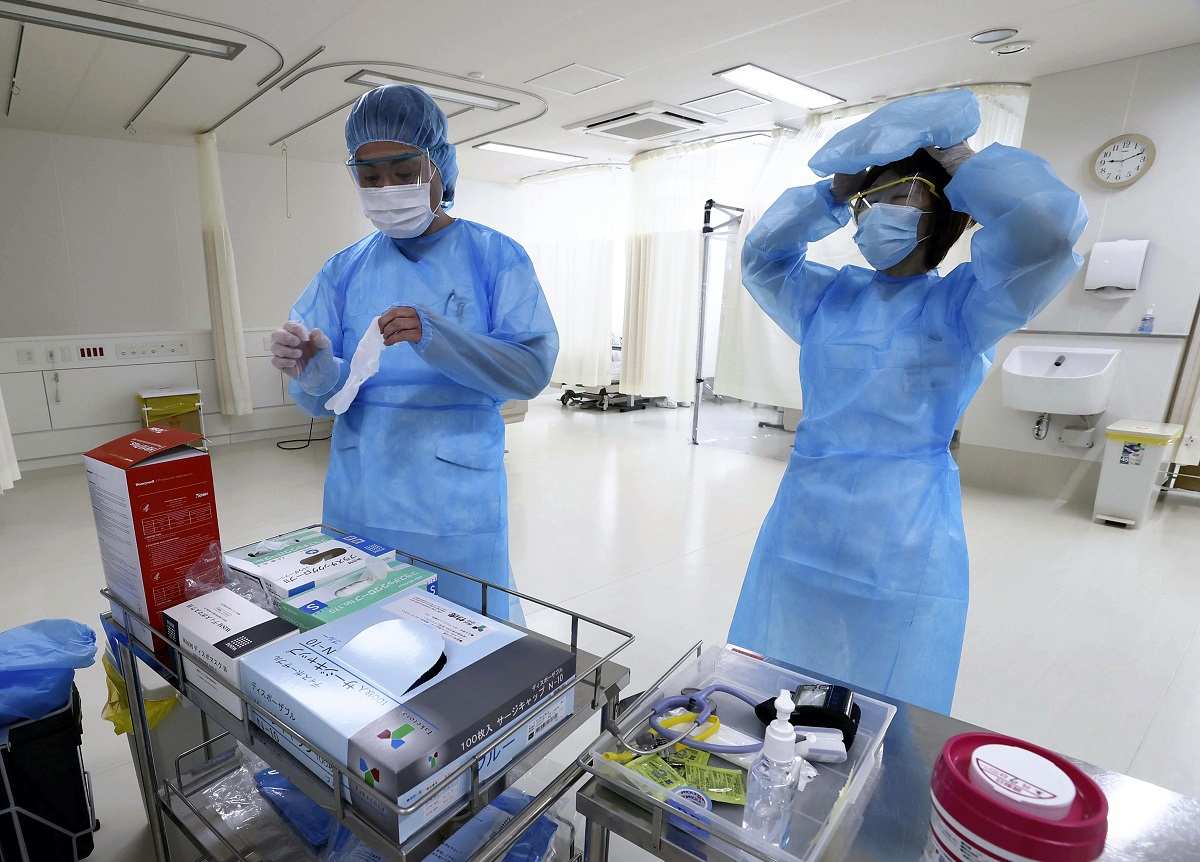
Medical workers put on protective gear in a dedicated COVID-19 ward at Nadogaya Hospital, Kashiwa, Chiba Prefecture, on Feb. 10.
18:34 JST, February 25, 2021
The lack of hospital beds amid the novel coronavirus pandemic has prompted the government to seek cooperation from private hospitals, which account for 70% of all hospitals in Japan.
Many small and midsize hospitals are reluctant to accept coronavirus patients because of a shortage of such staff as medical specialists and a lack of such facilities as intensive care units.
The acceptance of patients by such facilities will depend on government measures regarding infection control and financial support.
Local-level coordination
The director of a hospital in the Tama area of Tokyo that has fewer than 100 beds said: “Our hospital is small with no ICU, so I’m honestly scared to think about what would happen if a coronavirus patient became seriously ill.”
Since last summer, the hospital has reserved two beds for COVID-19 patients with moderate or mild symptoms. However, the facility has no infectious disease specialists and it does not offer advanced treatment that requires the use of ventilators or other such equipment.
In January, the hospital spent three hours trying to find a medical facility to treat a coronavirus patient in his 70s who was experiencing breathing difficulties.
“Under these circumstances, I understand why some small and midsize hospitals refuse to accept patients,” the director said.
Nadogaya Hospital in Kashiwa, Chiba Prefecture, began accepting COVID-19 patients with moderate or mild symptoms on Feb. 1.
“We want local governments to assume responsibility and take the lead in coordinating the transfer of patients,” said the hospital’s director, Kazuhito Matsuzawa.
26% of private hospitals
According to a survey by the Health, Labor and Welfare Ministry on medical institutions nationwide with acute care wards, as of January, 70-80% of hospitals run by public organizations and central government-authorized entities said they could accept COVID-19 patients, while the figure was 26% for private hospitals, only 5 percentage points higher than in November.
By size, private hospitals with fewer than 100 beds accounted for 9% of the total number of private facilities that accepted such patients, while those with 100 to 200 beds accounted for 24%.
Of the public and public-authorized institutions that accepted coronavirus patients, 80% were facilities with 201-400 beds, while private facilities in the same category accounted for only 51% of the total number of such hospitals that accepted such patients.
Problems implementing infection control measures to prevent the outbreak of clusters have also emerged.
A small hospital with about 60 beds in Tokyo had considered accepting severe COVID-19 patients several times but abandoned the idea because the size of the hospital makes it difficult to create separate infection-hazard and safety zones.
“We have started accepting COVID-19 patients who have recovered and are less likely to be contagious. We would like to help ease the hospital bed situation as much as possible,” the hospital chief said.
The government is providing subsidies to hospitals for securing beds and equipment to gain the support of reluctant medical institutions.
Law revision
The Osaka prefectural government tried to secure an additional 200 beds for coronavirus patients in late December, when the availability of hospital beds was tight, seeking cooperation from 108 private hospitals that were not accepting COVID-19 patients. However, by early January this year, the number of beds had increased by only about 30.
The situation prompted a tougher stance from Gov. Hirofumi Yoshimura, who mulled issuing “instructions,” rather than “requests,” in accordance with the special measures law to cope with new strains of influenza to make private hospitals allocate beds.
About 30 more private hospitals had eventually responded by Jan. 31, raising the number of additional beds to 165.
“The private sector does not have a lot of spare capacity, and the efforts of each hospital are almost at the limit,” a senior Osaka prefectural official said.
The powers of governors have been strengthened under the revised Infectious Diseases Law, which took effect on Feb. 13. Governors can issue advisories to medical institutions regarding bed availability. Failure to comply could result in the names of institutions being exposed.
However, it is uncertain whether the measure will be effective.
Prefectural governments have mentioned the importance of relationships of trust with medical institutions to secure hospital beds and difficulties that will arise unless staffing issues are addressed
Josai University Prof. Tomotoshi Iseki said: “Getting private hospitals ready to receive such patients for the future is important. However, it is realistic to make requests according to the size and function of each hospital, for example, asking hospitals with more than 200 beds to accept infected patients, while urging ones with less than 200 beds to accept recovering patients.”
Iseki, who specializes in regional medical care, added, “In addition to more financial support from the government, it is essential to provide long-term comprehensive support, such as coordinating smooth hospital transfers for critically ill patients and dispatching infection control experts.”
Top Articles in Society
-

Man Infected with Measles Reportedly Dined at Restaurant in Tokyo Station
-

Man Infected with Measles May Have Come in Contact with Many People in Tokyo, Went to Store, Restaurant Around When Symptoms Emerged
-

Woman with Measles Visited Hospital in Tokyo Multiple Times Before Being Diagnosed with Disease
-

Australian Woman Dies After Mishap on Ski Lift in Nagano Prefecture
-

Foreign Snowboarder in Serious Condition After Hanging in Midair from Chairlift in Nagano Prefecture
JN ACCESS RANKING
-

Japan PM Takaichi’s Cabinet Resigns en Masse
-

Japan Institute to Use Domestic Commercial Optical Lattice Clock to Set Japan Standard Time
-

Israeli Ambassador to Japan Speaks about Japan’s Role in the Reconstruction of Gaza
-

Man Infected with Measles Reportedly Dined at Restaurant in Tokyo Station
-

Videos Plagiarized, Reposted with False Subtitles Claiming ‘Ryukyu Belongs to China’; Anti-China False Information Also Posted in Japan























